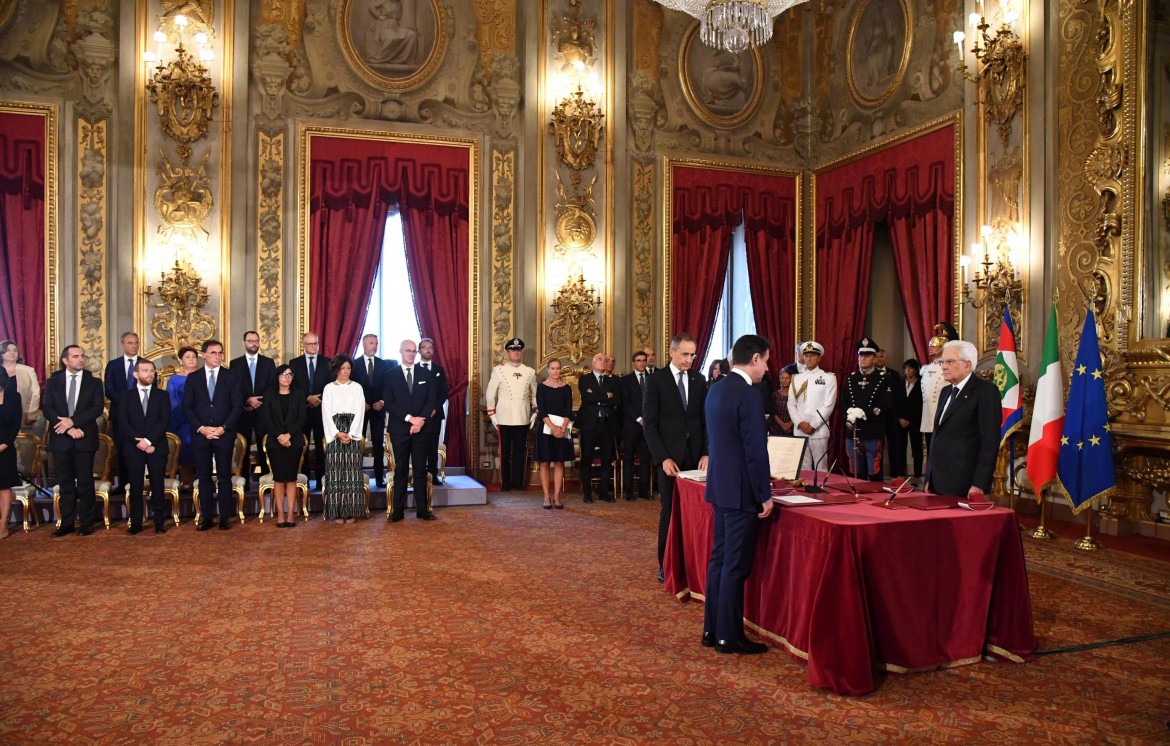Analysis
From eurosceptics to European Commissioner, the Italian transformation is complete
The Democratic Party is celebrating the appointment of Paolo Gentiloni to the European Commission. Some sections of the Five Star Movement are less thrilled by the party's makeover. 'We're delivering Italy over to the PD in Europe. I can’t recognize my movement anymore.'

The last piece, for now, to complete the “Ursula” government—after the charming name of President of the European Commission, Ursula van der Leyen, whose election is believed to have been the moment the Conte II project was conceived—will be decided at the first meeting of the Council of Ministers. But it is already a given that Paolo Gentiloni will be named European Commissioner, as this was part of the agreement negotiated between Conte and Zingaretti regarding the government package. The Democratic Party secretary was very keen on this, more so than on other points.
In addition, the renominated prime minister didn’t have alternative names to propose that would have put up a serious challenge. As a result, the new commissioner is set to be a guarantee of friendly relations—and even more than friendly—between the Commission and the Italian Government.
This choice completes the U-turn in the stance of Grillo’s party toward the European Union—from aspiring Eurosceptics and allies of Farage to staunch pro-Europeans. Thanks to the Democratic Party and to Gentiloni’s high profile, Italy might even win the portfolio for economic affairs, the one currently entrusted to the French Pierre Moscovici, the Socialist hawk who has gradually softened his positions over the years, particularly when it comes to Italy.
It was Moscovici who expressed his support for Roberto Gualtieri’s candidacy for the European Parliament, and who is now pleased with the appointment of his friend as Economy Minister in a government that over the space of 20 days has transformed from being the spearhead of anti-European sovereignism to a friendly proponent of harmony within the Union, at least so far.
Van der Leyen will decide on Gentiloni’s portfolio on Tuesday. It’s no surprise, however, that his appointment, just like Gualtieri’s the day before, has been received with satisfaction by the European chancelleries. Moreover, since at this point even Germany will have to request fiscal flexibility, it is not a paradox that Italy might go from being under special supervision to becoming the supervisor.
Gentiloni enjoys almost universal approval. This is not as much due to his credentials as an old pro-European, but rather on account of the individual style with which he has gone through many political stages (from Maoist to environmentalist, with a history as an activist for the pacifist magazine Pace e Guerra, close to il manifesto, finally ending up at Rutelli’s Democracy is Freedom – The Daisy party and then in the PD). His status as a sympathetic figure for the left was consolidated in 2016, when, after he served as Foreign Minister at Napolitano’s bequest, he became the post-referendum prime minister who did his best to drag that legislature away from Renzism, mitigating the effects of the arrogant failures of the latter.
Now, his nomination was welcomed by the CGIL union, as well as by the LeU. Fornaro, the leader of the LeU group in the Chamber of Deputies, gave him high praise: “With him, it’s possible to open up a new phase for the EU, which would favor growth and the fight against inequality and abandon the single-minded approach of austerity. The first move of the new government marks a new and positive beginning.” Even the Democratic Party has rallied—temporarily—around Gentiloni: from Nicola Zingaretti’s pride to the “Right on!” tweeted by Carlo Calenda and Enrico Letta’s “Thank you.” All the way to Matteo Renzi’s “Great choice,” even though he had caused some bad blood between him and his successor at the Palazzo Chigi, even on a personal level.
It was just 10 days ago, on Aug. 23, that Renzi, in a statement from his school of political education, was accusing Gentiloni of wanting to sabotage the deal with the Five Stars. “That’s offensive and ridiculous,” Zingaretti had replied. All water under the bridge? Most likely. On Thursday, the PD secretary has spent the day at the PD headquarters in Via del Nazareno working on the list of undersecretaries: seven women for 21 ministers is still not quite enough, but the PD’s list features plenty: Debora Serracchiani, Ascani Anna, Marina Sereni, Lia Quartapelle, Silvia Velo, Michela Rostan, Rossella Muroni, Lorenza Bonaccorsi.
The voices criticizing Gentiloni’s appointment are almost exclusively from the opposition. The most outraged is, of course, Matteo Salvini: “Di Maio, Grillo, do you remember the revolution? They went from the gilets jaunes straight to Gentiloni … the best representative of the power system, the smoke-filled rooms, the powers that be.” This argument does hold some strength for those who had been allies of the Lega until less than a month ago, and not just for dissident figures like the journalist and Senator Gianluigi Paragone, who is always keen on attacking “the custodians of the pro-European liturgies,” but also for figures closer to Di Maio, such as the MEP Dino Giarrusso: “They could have done better, in terms of process.”
The dissatisfaction is palpable among the M5S delegation in Brussels: “We’re delivering Italy over to the PD in Europe. I can’t recognize my movement anymore,” said Nicola Pedicini. The Five Star representatives in Rome are not very happy either: “I hope this is the first of only few mistakes that this government will make,” warned the deputy Andrea Colletti.
Originally published at https://ilmanifesto.it/europeisti-anche-troppo-gentiloni-commissario-malumori-a-5-stelle/ on 2019-09-06
